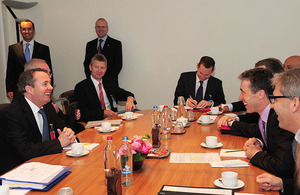Liam Fox: NATO support crucial to building Afghan forces
Secretary of State for Defence, Dr Liam Fox, has welcomed the rapid progress in training the Afghan National Security Forces, and the role of the NATO Training Mission in Afghanistan, but insisted that NATO allies still need to up their game.

Meeting attended by UK Defence Secretary, Dr Liam Fox, and NATO Secretary General, Anders Fogh Rasmussen [Picture: NATO, 2010]
He confirmed Afghanistan as the highest foreign policy priority of the new British Coalition Government, and the top priority for the Ministry of Defence.
Speaking on the last day of his first NATO meeting in Brussels, Dr Fox said:
The British Government supports both the mission and the counter-insurgency strategy.
I encourage allies to demonstrate strategic patience and give time for the counter-insurgency strategy to work, but stress the need to be able to show significant progress, consolidating ISAF’s hold in central Helmand, and accelerating the training of the Afghan security forces.
We need to step up our approach to communicating the vital importance of the mission in Afghanistan. We need to produce a stronger narrative alongside the political leadership we are providing to ensure that our troops get the support they deserve.
Dr Fox emphasised that the NATO Training Mission is key to ISAF’s strategy for transition, to ensure the Afghans can take the lead in securing their own country in future:
General McChrystal told this meeting that the Afghan National Security Forces [ANSF] are making quick progress in terms of training, but we still have some way to go in terms of improving the Afghan National Police and getting the numbers and quality of training up to the level we require.
We recognise the vital role of the training mission. We will assess whether we can contribute more and urge others to do the same.
Let me be direct: we are aware of the difficulties that some countries face in sending combat troops - politically and even constitutionally. However, there is no excuse for any country here not to send trainers to the Afghan mission.
If we fail in the NATO Training Mission it will signify a lack of political will and a failure of moral resolve.
We need to ensure we can build up that critical mass of the ANSF, so that when we do leave Afghanistan, we leave behind a secure country, and not a security vacuum. There is a moral duty on every member of NATO to contribute to that training mission, and that’s the message I give to our NATO partners today.

Dr Liam Fox (right) meets NATO Secretary General, Anders Fogh Rasmussen, in Brussels [Picture: NATO, 2010]
Dr Fox welcomed progress that is beginning to be made on planning for transition, in advance of the Kabul Conference in July:
It is important to ensure that both ISAF contributors and the Government of Afghanistan are involved in developing the plan for transition and that the process should be transparent, allowing ISAF partners to communicate progress towards transition to domestic audiences.
Security criteria should be the most important in assessing readiness for transition. Though some level of governance and development is essential for delivering security, we must not set the bar too high. Governance and development efforts will continue through and beyond transition.
Dr Fox also reaffirmed that NATO remains the most important strategic relationship for the United Kingdom:
NATO is the core of the security and defence of all its members, on both sides of the Atlantic. It is the UK’s instrument of first resort for collective security challenges.
One of the reasons why NATO remains so important and so successful is its ability to change as risks and threats evolve. Afghanistan is one example of a task that would have been inconceivable a decade ago. Then the alliance was being told to go out of area or out of business. Today, it is very much in business but facing even greater challenges.
Dr Fox emphasised that NATO has primacy in terms of Europe’s security and the starting point should be that the EU only acts militarily when NATO cannot or chooses not to:
I recognise, of course, that there will be occasions when it is appropriate for the EU to intervene but the EU should avoid duplicating the functions NATO already performs and the capabilities it already possesses.
In today’s economic climate, the last thing any Defence Minister needs to put to his or her Finance Minister or Generals is a case for militarily unnecessary duplication. NATO and the EU need the strongest possible links and what matters most is what works best.
Dr Fox expressed concern over the state of NATO’s finances but said that he was encouraged by the Secretary General’s report to members which made it clear that much has been done to bring these under proper control.
During two days of meetings in NATO Headquarters, Defence Ministers discussed NATO reform, resources, capabilities and missile defence, and met in ISAF and KFOR formats to discuss Afghanistan and Kosovo. There were also meetings of the NATO-Ukraine Commission, the NATO-Georgia Commission and the Nuclear Planning Group.
In the margins of the formal meetings, Dr Fox met the NATO Secretary General and the Defence Ministers of the Czech Republic, Estonia, Norway, Denmark, Poland, the Netherlands, France, Afghanistan, Canada, Turkey, Portugal, Latvia, Australia, the United States and Hungary.
Updates to this page
-
Added pics
-
This news article was converted to a news story